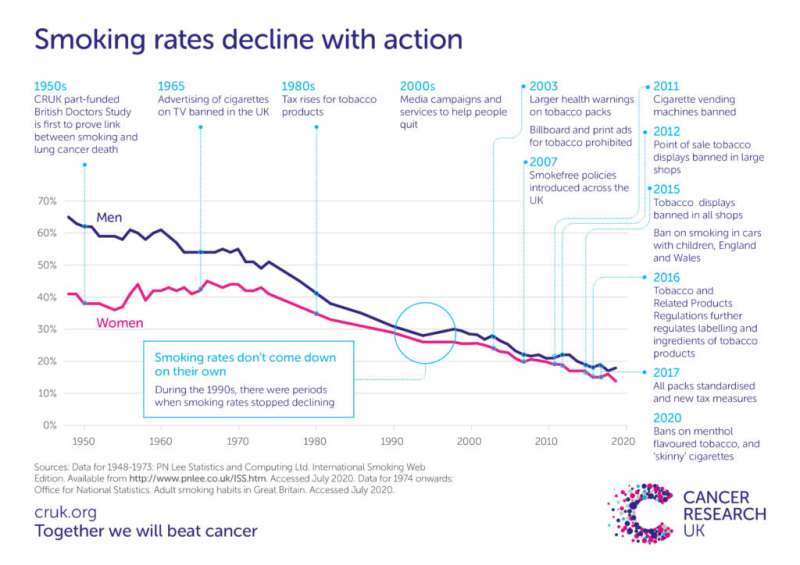
The UK government is almost a decade behind achieving its target for England to be smokefree by 2030, a new report published by Cancer Research UK reveals.
The report warns that, if recent trends continue, the target will now not be met until 2039. This is despite repeated warnings from the charity that data up to 2018 indicated the Government was already seven years off track.
The charity is now calling on the Secretary of State for Health and Social Care, Rt Hon Steve Barclay MP, to publish a plan for tobacco control. This must include more action to prevent young people from smoking, and more funding for the measures and services needed to help people quit.
Chief executive of Cancer Research UK, Michelle Mitchell, said, “Smoking remains the largest preventable cause of cancer and death in the UK, but the Government has the power to change this.
“With bold action and strong leadership, we can ensure a future free of tobacco for reducing cancer and saving lives.
“We urge Steve Barclay to continue his legacy of being bold with tobacco control to reduce the number of people getting and dying of smoking related cancers, relieve the pressure on the NHS, and save the country billions of pounds each year.”
Follow the roadmap
While smoking rates are declining, in order to reach the goal of making England smokefree by 2030 smoking rates need to drop around 70% faster.
If the Government misses this target, and current trends continue, smoking could cause around one million cancer cases in the UK between now and 2040.
In June, the UK Government commissioned an independent review of tobacco control (the Khan Review) which was published setting out policy recommendations that would see England become smokefree.
Despite being given clear recommendations, and a ‘roadmap’ of how to achieve the target, the Government has failed to respond to the recommendations.
However, Steve Barclay has history of voting in favor of tobacco control, including the 2015 ban on smoking in cars when a child is present, and the 2016 introduction of standard packs across the UK.
And that has made a difference. Further analysis by the charity shows that, if smoking rates had stayed at their 2014 levels, before both measures were introduced, 2.7 million more people would smoke than do today.
Moreover, recent polling for Cancer Research UK by YouGov has shown that there is public appetite in England for key recommendations made in Javed Khan’s independent review into tobacco, including raising the age of sale and providing funding for smoking cessation services.
The poll also found that 70% of respondents supported the Government investing more money to help England to become smokefree.
The consequences of missing a smokefree target
Though smoking rates have fallen over time, due to a combination of key policy changes and increased awareness of the risks, the decrease has not been happening fast enough, nor equally across the population.
Smoking remains higher compared with the national average in people aged 18-21, and among the most deprived communities compared with the least.
Concerningly, there are nearly twice as many cancer cases caused by smoking in the poorest areas compared to the wealthiest in England.
In addition, it is estimated that around 500,000 hospital admissions every year in England are attributable to smoking and that smoking costs the economy £17 billion per year.
Of this, £2.4 billion falls on our NHS, £1.19 billion falls on the social care system, and over £13 billion is lost in productivity costs from tobacco-related lost earnings, unemployment and premature death.
This is notably less than the £10.26 billion collected in tobacco duty in 2021/2022 for the whole of the UK.
Cancer Research UK are recommending that if Government cannot fund measures to help people quit as laid out in the proposed tobacco plan, the tobacco industry must be made to foot the bill.
Chief clinician of Cancer Research UK, Professor Charles Swanton, said, “Quitting smoking is one of the most popular New Year’s resolutions. But people are rarely successful on their own—they need support and the right tools to help them quit.
“Despite this, budgets for stop smoking services have been repeatedly cut, and access varies greatly across the country.
Source: Read Full Article


